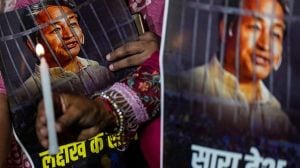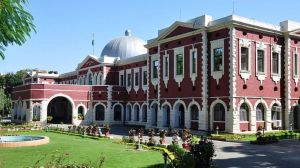From chaos to Shantih
Tiresias -- the Greek mythological character (both man and a woman) who was cursed to lose sight after he sided with Jupiter over a fight...

Tiresias — the Greek mythological character (both man and a woman) who was cursed to lose sight after he sided with Jupiter over a fight with his wife that a woman derives more pleasure from love-making. Oedipus — the King who became blind after unwittingly committing incest by marrying his mother. A prophet experiencing the chaotic mind of a King who discovers that he has committed incest. Like the monarchs of a degenerating Europe after World War I. Eastern Europe — a wasteland, where rulers were incapacious to control the lands they ruled. They were impotent. As was Oedipus’ land and that of T S Eliot’s central poem of the 20th century — a collage of umpteen allusions from the Bible down to Hermann Hesse, including allusions from oriental philosophy (the Buddha and the Upanishads).
That Eliot’s Waste Land was initially met with scepticism has had no effect on the number of books written on the poem or the celebrity statue it ultimately attained. And neither did it matter to NinazKhodaiji — it was her favourite poem and her mission was to translate the experience on to the stage.
Curtains go up on Tiresias. Music — Richard Wagner’s opera. Frisch weht der Wind,/ Der Heimat zu,/ Mein Irisch Kind,/ Wo Weilest du?, the Sailor’s song which opens Wagner’s immortal Tristan and Isolde, meaning "Fresh blows the wind to the homeland — my Irish child, where do you wait." Action, but no lights. Darkness embodies blind Tiresias. And King Oedipus.
When Ninaz Khodaiji and Jiten Merchant of Play Reading Forum first enacted the brilliant work edited by Ezra Pound at the Art Attic Gallery, they had lilac-lit bulbs and an informal audience looking into their eyes as they recited: April is the cruelest month, breeding/ Lilacs out of the dead land, mixing/ Memory and desire, stirring/ Dull roots with spring rain./ Winter kept us warm…
With Wagner’s opera in the lead, Eliot’s paradox of seasons brilliantly prefaces the entry of Madame Sosostris, the fake prophet of Aldous Huxley’s ChromeYellow to whom Eliot is alluding to. Madame Sosostris, who besides being Sosostris is also all other female voices in the enactment, is played by Khodaiji, with all other male voices rendered by George Jose. For, all men are one man, all women are one woman — one of the key interpretation of Eliot’s work which Khodaiji chooses to present, notwithstanding that the poet didn’t take kindly to his Waste Land being straitjacketed into that kind of unity.
And then come the other four sections — A Game of Chess, The Fire Sermon, Death By Water and What the Thunder Said — with brilliant musical references chosen by Merchant himself, and sung quite brilliantly too — something that makes the Waste Land’s stage version come to life. It, in fact, almost breathes. But there are no European connotations. It’s universal. There’s dissociation, desensitisation, confusion, breakdown of interpersonal relationships, existentialism and degeneration of quality of life. The staging, like the poem, focuses on the internalexperience, the kind F H Bradley subscribed to and a theme which Eliot refers to with approval. It is, quite like the poem — an encyclopedia of apparent randomness. Like the poem, it is pregnant with broken images and fragments, attempting to analyse the cause of chaos and the possibility of redemption — only it lacked the intensity of Eliot’s poetic vision.
And in the end we fall short of seeing what Tiresias, though blind, throbbing between two lives,/ Old man with wrinkled female breasts, saw in The Waste Land. After all the chaos, does he really find acceptance that goes beyond body, mind and intellect to a higher state called peace? We are not to know except that it is Shantih, with another of Waghner’s brilliant composition, violins soaring, as the backdrop.
Nevertheless, Khodaiji’s off-the-beat version of The Waste Land has the potential of being a gripping light-and-sound show specially to an educated audience. We hope the venue does justice. Also, an entirely atmospheric enactment, thedisturbance is lethal. So, be on time.
At the British Council Division. On August 3 and August 4. Time: 6.30 pm.





- 01
- 02
- 03
- 04
- 05


























